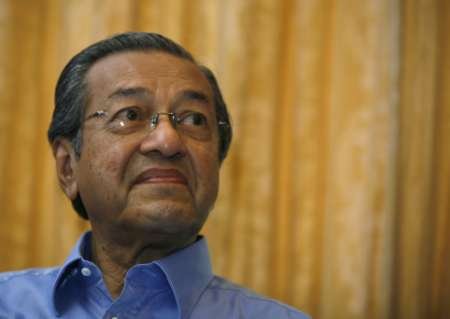PETALING JAYA, July 25 ― Tun Dr Mahathir Mohamad today appeared to suggest that Malaysia insist on an “exit clause” on the Trans-Pacific Partnership Agreement (TPPA), using his long-standing grouse on the country’s supply of raw water to Singapore to illustrate the need.
 A fortnight ago, Dr Mahathir (picture) had joined the growing number of voices speaking out against the US-led free trade agreement, warning that it would be another in a long line of “lopsided” deals that Malaysia kept walking into.
A fortnight ago, Dr Mahathir (picture) had joined the growing number of voices speaking out against the US-led free trade agreement, warning that it would be another in a long line of “lopsided” deals that Malaysia kept walking into.
His inclusion of the water supply deal to Singapore as among such skewed agreements led one commentator on his blog at chedet.cc to point out that Malaysia actually benefited more from the deal with the republic.
“I would like to thank the visitor to my blog who pointed out that the terms of the agreement to supply raw water and receive treated water to and from Singapore actually favours Malaysia. I agree. But I am talking about revision in the price of raw water,” the former prime minister wrote in his latest blog entry.
Under the deal, Malaysia is eligible to buy 12 per cent of Singapore’s treated water at a price of 50 sen per 1,000 gallon, which costs the republic approximately RM1.10 to treat. This represents a savings of 60 sen per 1,000 gallons for the former country.
But insisting the 3 sen per 1,000 gallons that Malaysia sells the water for was “ridiculous”, Dr Mahathir hypothesised the consequences of raising the price to 6 sen, or a 100 per cent increase.
“It can be assumed that Singapore would want to increase the price of treated water. It may ask for the same quantum, i.e. a 100 per cent increase to RM1.00 per 1,000 gallons,” he theorised.
In such a scenario, the savings versus treating the water in Malaysia was reduced to 10 sen per 1,000 gallon, or sufficiently negligible as to consider exiting the agreement.
“If there [are] negotiations then Singapore might be persuaded not to increase or to increase at a lower rate. But this will not be the end.
“Malaysia should learn to include exit clauses when entering into agreements. It should always remember that over time money depreciates, i.e. prices increase,” he concluded.
On July 13, the former prime minister had skewered the Ministry of International Trade and Industry’s apparent insistence on signing the TPPA despite lingering concerns over what the country stood to gain from the deal.
“Look at all the agreements we have entered into and you will find practically none of them favours us,” he wrote then.
“Now we want to swallow the American-conceived TPP, Trans Pacific Partnership. This is another attempt by America to let their huge corporations penetrate the domestic markets of the small countries, in particular government procurements,” he wrote then.
Dr Mahathir also complained previously that signing the agreement would leave the country vulnerable to legal action from international corporations, and added his doubts about Malaysia’s ability to fend off such lawsuits.
“If we breach the agreement, their corporations can sue the government for billions. I have my doubts about our ability to convince the international arbitrators or courts,” he wrote.
“We cannot even convince the World Court over Pulau Batu Puteh.”
Pulau Batu Puteh, or Pedra Branca as it is now known, was a disputed island claimed by Malaysia and Singapore. It was ruled to be Singaporean territory by the International Court of Justice in 2008 after a protracted legal battle.
“They will have the best lawyers, lots of them. We will exhaust all our funds to pay our less experienced lawyers. At the end we will lose and pay indemnities and fees running into billions. And we will continue to pay until we comply. And when we comply we will lose more money,” Dr Mahathir predicted.
The TPPA is a free trade agreement that has been negotiated by the US, Malaysia and nine other nations as part of the larger Trans-Pacific Strategic Economic Partnership since 2010.
Critics allege that the agreement has since been co-opted by powerful corporations to allow them to trample over existing consumer, worker and environmental rights in signatory countries.
Although it is not definitively known how much — if any — of the allegations are true, the secretive nature of the negotiations continues to provide a fertile breeding ground for such speculation.


















